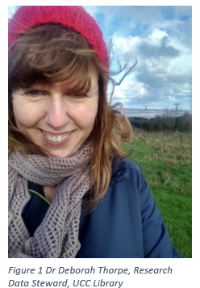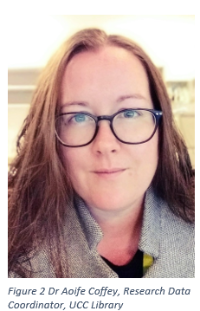In This Section
Study on Embedded Data Steward to provide direct support with data management and sharing to projects with arts and humanities data
A new pilot study at UCC will examine the practicalities of ‘embedded data stewardship’ within specific research domains, beginning with projects with arts and humanities data. The study, led by Research Data Steward Dr Deborah Thorpe and Research Data Coordinator Dr Aoife Coffey has the overarching aim of supporting researchers to improve the discoverability, reusability and sustainability of their arts and humanities data.
 ‘Data’ in the arts and humanities could be defined broadly as all materials and assets scholars collect, generate and use during all stages of the research cycle. In contrast to hard sciences, initial data in arts and humanities is often collected rather than generated. As a result, researchers may be inclined to think in terms of ‘materials’ and ‘outputs’ rather than ‘data’. Regardless, sharing the information underpinning a publication is important for verifying your arguments and enhancing readers’ understanding of your publications. However, even in the sciences, data preservation and sharing can be patchy, which leads to serious problems: a 2014 study found that the likelihood of the data behind a journal article being extant fell by 17% per year. This means that the findings of those publications are difficult to verify or reproduce in subsequent studies. Problems even arise when the reader attempts to contact an author to find out more: the odds for there being a working e-mail address for the first, last, or corresponding author fell by 7% per year (Vines et al, 2014, https://doi.org/10.1016/j.cub.2013.11.014).
‘Data’ in the arts and humanities could be defined broadly as all materials and assets scholars collect, generate and use during all stages of the research cycle. In contrast to hard sciences, initial data in arts and humanities is often collected rather than generated. As a result, researchers may be inclined to think in terms of ‘materials’ and ‘outputs’ rather than ‘data’. Regardless, sharing the information underpinning a publication is important for verifying your arguments and enhancing readers’ understanding of your publications. However, even in the sciences, data preservation and sharing can be patchy, which leads to serious problems: a 2014 study found that the likelihood of the data behind a journal article being extant fell by 17% per year. This means that the findings of those publications are difficult to verify or reproduce in subsequent studies. Problems even arise when the reader attempts to contact an author to find out more: the odds for there being a working e-mail address for the first, last, or corresponding author fell by 7% per year (Vines et al, 2014, https://doi.org/10.1016/j.cub.2013.11.014).
There is a clear need for researchers to be supported in managing and sharing their data, and this is where data stewardship comes in. Data stewardship can be defined as ‘the tasks and responsibilities that relate to the management, sharing, and preservation of research data throughout the research lifecycle and beyond’. A professional data steward can provide general advice, or they can work more directly with the researchers – an ‘embedded data steward’. The embedded steward must have domain specific knowledge, because they collaborate closely with members of the research team on data-related processes such as developing Data Management Plans (DMPs); implementing and revising DMPs; preparing data and metadata for repositories – tasks vary depending on the needs of the project and the stage in the research data lifecycle
 From January 2023 onwards, Deborah Thorpe – who has a background in interdisciplinary humanities research – will be working in this embedded capacity with a selected number of research projects with arts and humanities data. She and the pilot study team will be recording and analysing the type of support given to these projects and comparing this with comparable work being done by colleagues in health research. By the end of the pilot, the Research Data Service will have an evidence base for offering a costed embedded data stewardship service at UCC in the future and will enable funding applicants to build in embedded support from the pre-award stage. Importantly, we will also gain an enhanced understanding of data-related needs of arts and humanities researchers, allowing us to improve the everyday advice, guidance, and training that we offer to all UCC researchers.
From January 2023 onwards, Deborah Thorpe – who has a background in interdisciplinary humanities research – will be working in this embedded capacity with a selected number of research projects with arts and humanities data. She and the pilot study team will be recording and analysing the type of support given to these projects and comparing this with comparable work being done by colleagues in health research. By the end of the pilot, the Research Data Service will have an evidence base for offering a costed embedded data stewardship service at UCC in the future and will enable funding applicants to build in embedded support from the pre-award stage. Importantly, we will also gain an enhanced understanding of data-related needs of arts and humanities researchers, allowing us to improve the everyday advice, guidance, and training that we offer to all UCC researchers.
If you are interested in being part of the pilot study, or have any data related questions or needs, you can contact us at the Research Data Service at researchdata@ucc.ie
Deborah Thorpe and Aoife Coffey
If you are interested in being part of the pilot study, or have any data related questions or needs, you can contact the Research Data Service at researchdata@ucc.ie
College of Arts, Celtic Studies & Social Sciences
Coláiste na nEalaíon, an Léinn Cheiltigh agus na nEolaíochtaí Sóisialta
Contact us
College Office, Room G31 ,Ground Floor, Block B, O'Rahilly Building, UCC
